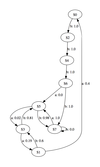
David Arden
- Position
- Postgraduate Research Student
- Institution
- Electronics and Computer Science (FPAS)
- D.M.Arden@soton.ac.uk
- Contact
- Complete this online contact form to contact David.
I am in the first year of my PhD at the Institute for Complex Systems Simulation.
My research focuses on understanding non-classical computation - computation that isn't restricted to the world of logic gates and Turing completeness. Many examples of naturally occuring intrinsic computation that we observe take the form of self-organising systems. These systems may not be general purpose computers, but they might still be very useful. The aim is to apply an information theoretic framework to the analysis of self-organising systems and the computations they perform.
The ultimate goal of this research is to improve our ability to engineer systems which can take advantage of the benefits of self-organisation and intrinsic computation - Guided Self-Organisation. These benefits are often claimed to include dynamic adaptivity, robustness to individual failure, and the greater efficiency possible in special purpose systems (as opposed to universal computers).
Before we can do this however, there are many things we need to better understand. What exactly do we mean by a "self-organising" system? How does self-organisation occur in the natural world? Are there many different mechanisms, or just different instantiations of the same thing? Also, in what way does a truly decentralised system store, transmit, and process information?
In order to do this we need to:
- formalise our inutitive notions in ways which both make sense and are useful.
- discover what properties of a system (and the environment in which it is embedded) which are relevent to self-organisation and computation.
- understand how to develop and steer self-organising computation which perform a useful function.
I believe by investigating minimalist abstract simulations, including imitations of natural self-organisation and attempts at engineered self-organsiation, we might acheive this goal.
Research Interests
Life sciences simulation: Swarm Behaviour
Algorithms and computational methods: Agents, Cellular automata, Evolutionary Algorithms, statistical analysis
Visualisation and data handling software: Pylab
Software Engineering Tools: Eclipse, Git, Vim
Programming languages and libraries: C, Java, Matlab, Python
Computational platforms: Mac OS X, Windows
Transdisciplinary tags: Complex Systems, Computer Science
Working with...
 Seth Bullock Seth BullockProfessor, Electronics and Computer Science (FPAS) |
